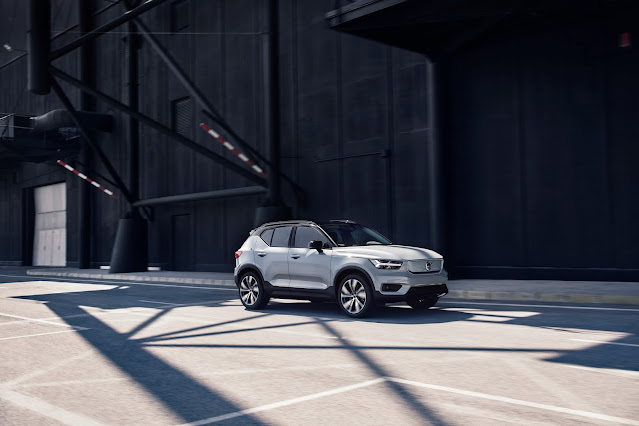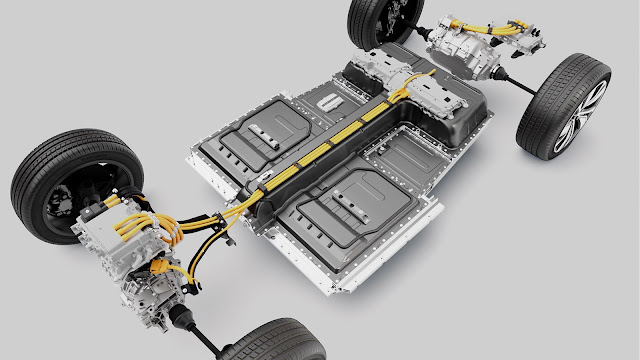Volvo Cars has made an investment in blockchain technology firm Circulor through the Volvo Cars Tech Fund, the company’s venture capital investment arm.
Circulor
and Volvo Cars have been working together in recent years on the implementation
of blockchain technology to boost the traceability of cobalt used in the
batteries of its electric cars.
Circulor’s
blockchain technology is today used throughout Volvo Cars’ battery supply
chain, which will achieve 100 per cent traceability of cobalt used in the XC40
Recharge P8, its first fully electric car. Production of the XC40 Recharge P8
will start later this year in Ghent, Belgium.
The
investment in Circulor by Volvo Cars allows both companies to expand their
focus beyond cobalt, for example by looking at increasing traceability of mica,
a mineral used as isolation material in the battery pack of electric Volvos.
Volvo Cars
and Circulor are also investigating the possibility to expand their blockchain
technology cooperation to other areas, for example tracking and reducing CO2
footprints, helping Circulor to potentially set standards for ethical sourcing
in automotive and other industries.
The
investment by the Volvo Cars Tech Fund is part of a funding round by Circulor,
which also involves three other investors: SYSTEMIQ, Total Carbon Neutrality
Ventures and Plug & Play.
“We are
committed to an ethical supply chain for our raw materials and our partnership
with Circulor has been instrumental in that regard,” said Martina Buchhauser,
chief procurement officer at Volvo Cars. “By supporting Circulor’s ongoing
development we can expand the use of blockchain technology in our operations
and contribute to a more sustainable business.”
Volvo Cars
was the first car maker to implement global traceability of cobalt used in its
batteries by applying blockchain technology across its supply chain. The
technology developed by Circulor is implemented in partnership with CATL and LG
Chem, Volvo Cars’ battery supply partners.
CATL and LG
Chem are renowned battery manufacturers with long and successful track records
supplying lithium ion batteries to the global automotive industry. They fulfil
Volvo Cars’ strict sourcing guidelines in terms of technology leadership,
responsible supply chains, reduction of carbon emissions and competitive cost
models.
The
agreements between Volvo Cars, CATL and LG Chem cover the supply of batteries
over the coming decade for next generation Volvo and Polestar models, including
the XC40 Recharge P8.
The Volvo
Cars Tech Fund was launched in 2018 and invests in high-potential technology
start-ups around the globe. It focuses its investments on strategic technology
trends transforming the auto industry, such as artificial intelligence,
electrification, autonomous driving and digital mobility.
Fr:
Volvo Cars
Tech Fund investit dans la start-up blockchain Circulor
Volvo Cars a investi dans Circulor, une entreprise
spécialisée dans la technologie blockchain, par le biais du Volvo Cars Tech
Fund, sa branche dédiée aux investissements en capital-risque.
Volvo Cars et Circulor collaborent depuis plusieurs années
au déploiement de la technologie blockchain pour améliorer la traçabilité du
cobalt utilisé dans les batteries des véhicules électriques du constructeur
suédois.
La technologie blockchain de Circulor est désormais
appliquée à l’ensemble de la chaîne d’approvisionnement en batteries de Volvo
Cars, et permettra la traçabilité complète du cobalt contenu dans
la XC40 Recharge P8, sa première voiture 100 % électrique
dont la production débutera plus tard cette année à Gand, en Belgique.
En investissant dans Circulor, Volvo Cars permet aux deux
entreprises d’étendre leur engagement à d’autres matières premières que le
cobalt – elles envisagent par exemple de renforcer la traçabilité du mica, un
minéral utilisé comme matériau isolant dans les batteries des Volvo
électriques.
Volvo Cars et Circulor étudient également la possibilité
d’étendre leur coopération à d’autres domaines que la technologie blockchain,
notamment au suivi et à la réduction des empreintes carbone, ce qui pourrait
permettre à Circulor de définir de nouvelles normes d’approvisionnement éthique
pour l’automobile et d’autres industries.
L’investissement réalisé par le Volvo Cars Tech Fund
s’inscrit dans le cadre d’un cycle de financement lancé par Circulor, auquel
contribuent trois autres investisseurs : SYSTEMIQ, Total Carbon Neutrality
Ventures et Plug & Play.
« Nous avons toujours eu à cœur de garantir une chaîne
d’approvisionnement éthique pour nos matières premières, et notre partenariat
avec Circulor est déterminant à cet égard, indique Martina Buchhauser,
responsable des achats chez Volvo Cars. En soutenant le développement continu
de Circulor, nous sommes en mesure d’étendre le recours à la technologie
blockchain dans nos activités et de contribuer à un modèle d’affaires plus
durable. »
Volvo Cars a été le premier constructeur automobile à
assurer la traçabilité du cobalt utilisé dans ses batteries en appliquant la
technologie blockchain d’un bout à l’autre de sa chaîne logistique. La
technologie mise au point par Circulor est exécutée en partenariat avec CATL et
LG Chem, les fournisseurs privilégiés de Volvo Cars pour ses batteries.
CATL et LG Chem sont des fabricants réputés, forts d’une
expérience éprouvée s’agissant de la fourniture de batteries lithium-ion pour
l’industrie automobile mondiale. Ils respectent le cahier des charges exigeant
de Volvo Cars, que ce soit en termes de leadership technologique, de chaînes
d’approvisionnement responsables ou de compétitivité des modèles de coûts.
Les accords conclus entre Volvo Cars, CATL et LG Chem
portent sur la fourniture de batteries sur la décennie à venir pour la
prochaine génération de modèles Volvo et Polestar, y compris la
XC40 Recharge P8.
Fondé en 2018, le Volvo Cars Tech Fund investit dans
des start-ups à fort potentiel technologique du monde entier. Il cible les
tendances technologiques stratégiques qui révolutionnent l’industrie
automobile : l’intelligence artificielle, l’électrification, la conduite
autonome et les services de mobilité digitaux.
Source:
Volvo Cars.






Commentaires
Enregistrer un commentaire